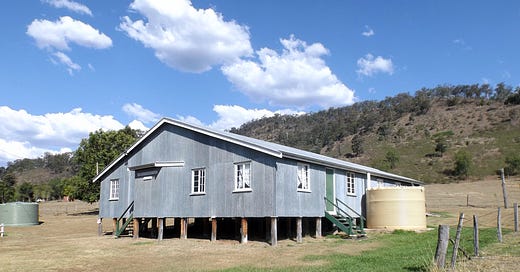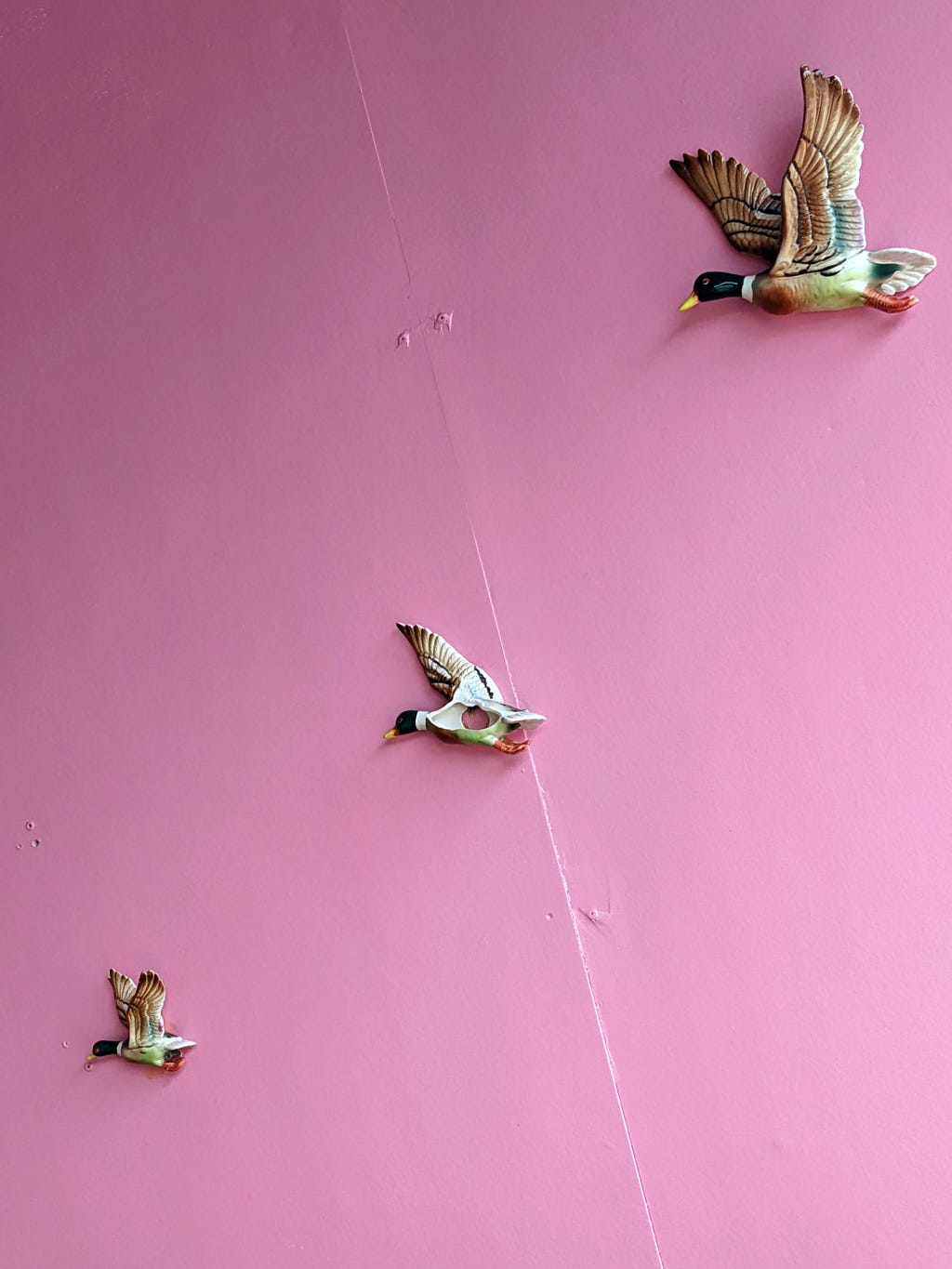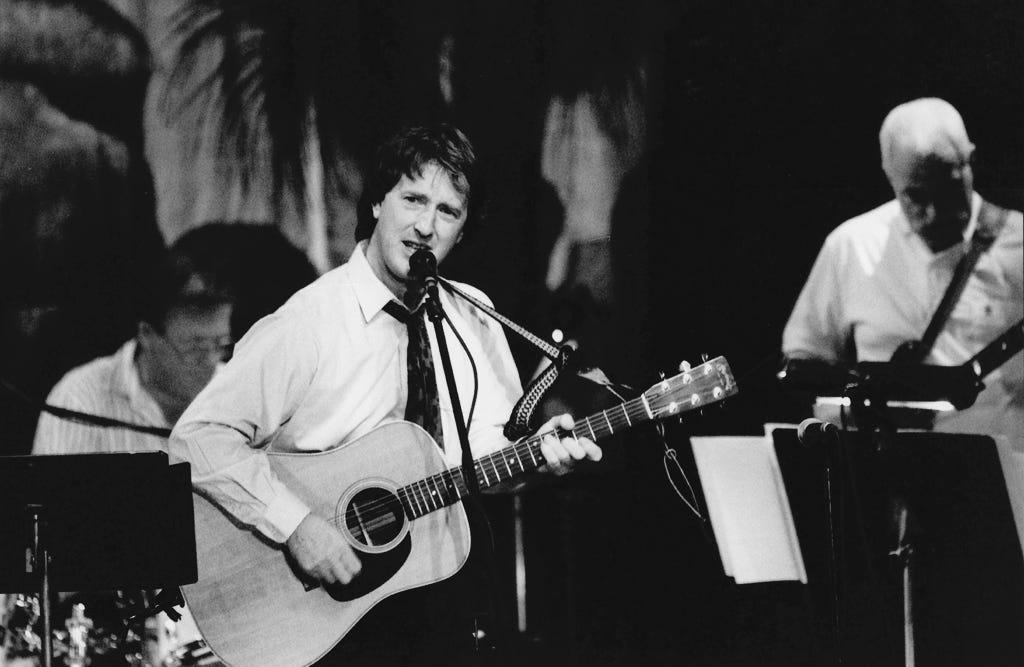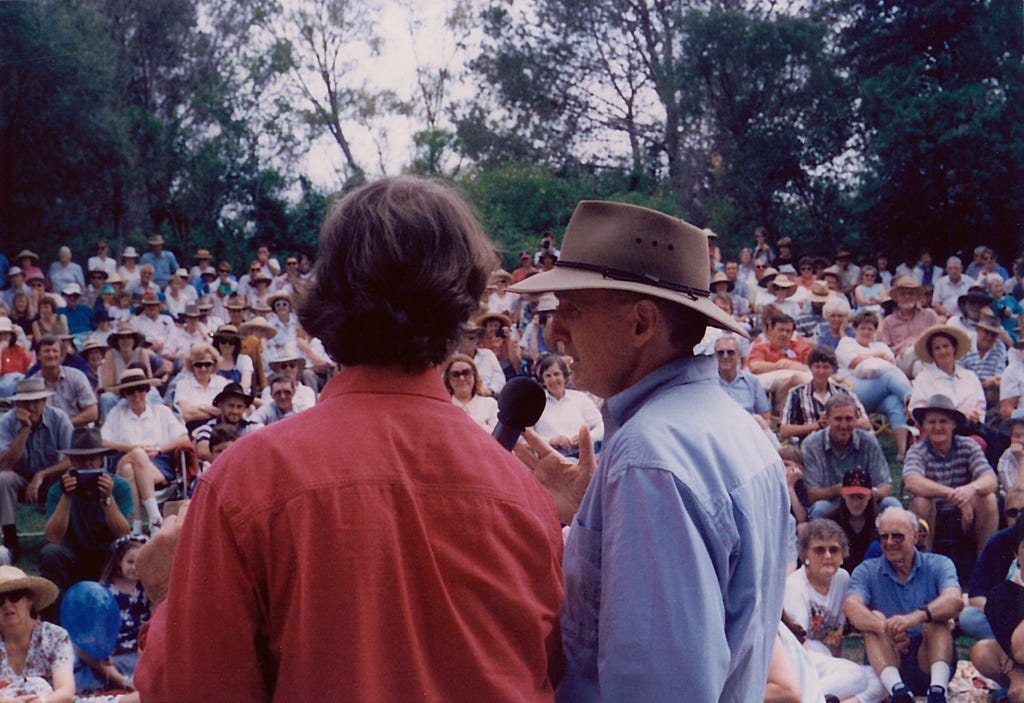No one could have known, on that dark lonely night 80 miles west of Brisbane, where I was.
I didn’t even know where I was.
When you’re lost in the bush at night, driving, you might as well be in a speedboat in the middle of the Pacific Ocean.
There are no lights except your own headlights, no signs except on your own dashboard, and every fence and tree and cow looks the same.
Do you keep going – powering on straight ahead, or turn right, or turn left – or go back the way you came?
And when you finally do stop and get out in the dark to examine a street sign, as I did, and it reads “Dry Gully Road”, you know to get back in your speedboat and keep going.
In the 1990s, popular Australian Broadcasting Corporation (ABC) radio presenter Ian “Macca” McNamara – of Australia All Over fame – was taking a shortcut south from Toowoomba on his way back to Sydney.
He was in his ageing Range Rover with his guitar alongside and some dry-cleaned shirts hanging above a window in the back … when he spied, in the Lockyer Valley, a charming sight.
It was all alone, deserted on a hillside ... an old Hall with walls and roof of unpainted corrugated iron sitting proudly up on tree-stumps topped with tin caps to prevent white ants from entering and eating the beams.
The steps and the door were painted green – presumably to tone in with the large tree alongside.
A small sign on the front said: “Fordsdale School of Arts”.
To Ian McNamara this was a paradise from the past.
A relic of a time generations ago when the Australian bush was more populated, but the people more isolated. When a dance at the local School of Arts was one of the few times the whole community gathered.
In his mind’s eye, I suppose Macca saw this Hall as it could be again ... bringing the locals together with music and song.
“I’d like to do a concert in that hall,” Macca said to himself ... even though it was 500 miles north of where he lived and worked in Sydney.
It’s part of the romance of the bush … a country dance … the music provided by the people: perhaps a squeezebox, a violin, a mouth organ, a piano. The huge urn for cups of tea. The lamingtons, the fruit trifles, the rectangles of chocolate delicious, the savoury puffs for supper.
And, unlike in the cities, all the generations mixing.
Come to think of it, Australia’s School of Arts Halls were the Facebook of their day … but better: with the texture and smell and nuance of human beings physically in the same room: dancing, laughing, gossiping, drinking … responding not only to the words spoken, but to their tone.
The raised eyebrow, the guffaw, the shrug of the shoulders … all those un-sanitised exchanges that crop up when you are face-to-face.
Extended, not truncated “yaks” … which created a camaraderie to face the common enemies: distance, droughts, weeds, fire, flood.
Looking out for each other.
Even helping strangers.
Ian McNamara had put on perhaps a hundred concerts around Australia: ostensibly to promote his radio show, but also because, as a singer, he needed to perform. There’s something deep inside him which wants to see an audience enjoying themselves.
Perhaps because on air he knew he had a million listeners … but he only heard them.
And only if they rang up.
“I love to see people laughing together,” he once told me when I toured the country with him.
For these concerts Macca put together his own Gumboot Band.
The tin School of Arts Hall that he had stumbled upon was built by the farming community of Fordsdale – population 52 – sitting in the bush 30 miles southeast of Toowoomba and 80 miles west of Brisbane.
There was absolutely nothing else around, so you couldn’t miss it ... or so I was told.
On his national four-hour Sunday morning radio show, Macca had serialised my book on an Australian childhood in the 1940s and ’50s: Over the Top with Jim.
To introduce each episode, he sang a song he’d composed and written himself. The resulting Over the Top with Macca album went platinum.
[He also wrote and recorded a theme song when he serialized my memoir of travelling through Red China and Russia in 1965: Spies Like Us.]
On stage Ian would sing “Over the Top with Jim” and say: “Don’t applaud me because … tonight, ladies and gentlemen, we have the author himself here: come on up Hughie!”
We never used a script.
Macca would ask me any question and I had to answer immediately. He’d warned: “Silence is a killer on air, and on stage … so come on talking.”
Once, in the Catholic Club in the seaside retirement town of Coffs Harbour, he asked, as I walked on: “You’re a Catholic Hughie, do you think there are many Catholics here tonight?”
The club was jam-packed with his listeners waiting to hear my answer.
Not knowing what to say (I didn’t even know there were Catholic Clubs in Australia), I blurted out: “Well Ian, it depends whether they believe in Heaven, Hell, Purgatory, and Limbo.”
“And where are those places?” Macca said.
Now I was starting to sweat, but I kept smiling.
“Well Ian, Heaven is up there; Hell is down there; and Purgatory’s … somewhere in between”.
Got out of that one!
“But what about Limbo Hughie? You didn’t say where Limbo is?”
I was stumped, but remembered one of Ian’s tricks … if you want to know something: ask the audience.
So I said: “Not sure Ian ... Does anybody here know where Limbo is?”
A lone voice from way up the back row boomed out “Yeah … Coffs Harbour!”
Which brought the house down.
The Fordsdale concert quickly booked out as word spread through the Lockyer Valley and beyond, and I agreed to drive out there to join Macca on stage.
But I had no idea where Fordsdale was.
I looked up a map and, as was my wont, memorized the way: drive west to Gatton and turn first left 25 miles south down the Gatton-Clifton Road.
Easy-peasy.
It was dark when I reached Gatton but I soon found what I was looking for … a major bitumen road heading left – which I knew was south – and, as I wasn’t expecting any other such main roads way out there, away I went.
After half an hour I hadn’t come across the Hall so sped up – I didn’t want to be late for my scheduled stage appearance about 40 minutes after “Showtime”.
Soon, I seemed to have gone so far so fast that I didn’t know whether to keep going or turn back. There wasn’t time now to go back to Gatton and head south again.
If it were daytime, I’d have a clue from the sun.
In 1965 I’d traversed south London west to east from Richmond to Bromley simply by following the sun. But the beautiful sky chock-full of stars out here meant nothing to a city slicker like me.
No signs. Shadowy. Black.
No people.
No landmarks.
Eventually, I spotted a farm house with its lights on and drove over a culvert and down to the house … to be welcomed by several angry dogs.
I could see the people inside and so waved through the windscreen like a wiper, hoping they would come out. But they wouldn’t.
Not in the dark. Not to a strange car.
So I backed out, up their long driveway, crossed the culvert in reverse, and went straight over their letter box. But they still stayed safely inside when I got out and tried to make it stand back up again.
As I gathered rocks to hold it up I realised that by now the concert would have started.
I’d been in dozens of these shows all around the country over the last decade and I could see it all taking place in my anxious mind.
Macca would walk out and probably say first up: “So that’s what he looks like!” … because his listeners had all heard, but not seen, him.
Then he’d swing his guitar strap over his shoulder, the band would strike up, and he’d launch into: “G’day g’day, well how’re ya goin’ … well strike a light…”
He’d have calico bags full of listeners’ letters, and would pull some out and read a pertinent line or a stanza of verse.
Every concert the music changed. So each time Macca drew up a “rundown” of the songs he wanted to sing that night – and in what order – which was handed out to each band member and guest artist: including me.
Ian was a perfectionist who insisted on everything, and everyone, going to plan.
But where was I?
By now he’d probably be singing: “I love to see the magpies, walking in the garden, sit by the window and have a cup of tea…” Or “Stars Fell on Alabama” … but substituting Woolloongabba, Oodnadatta and Wangaratta: great Australian names.
If I was lucky he’d do “I Made a Hundred in the Backyard at Mum’s” because it lasted longer and this would give me a few extra minutes to get there.
At long last, I saw the headlights of another speedboat on this deserted ocean.
I pulled over and stood on the roadside next to my white Mazda – to make sure they saw me – and held my arm up in a STOP signal.
Instead of slowing down, the car sped up and kept going off into the abyss … and so too did the next one.
All into the bush void.
I was learning that people living alone in the bush are extremely cautious … at least at night on this dark, lonely plain.
By now Macca would be showing the audience the gold-plated rabbit trap that a listener had sent him as a gift … which would lead into the song “I am the Rabbit Trapper, a cunning bunny snapper…”
After that he’d probably rush down into the audience and put a microphone in front of someone, anyone, and interview the surprised individual.
People in the audience would be giving him gifts as he did the rounds: photos, songs, home-made demo tapes, self-published books, poems, a knitted jumper, home-made jam, a passionfruit sponge cake, sultana sandwiches…
One time, a listener gave him a puppy which grew into a very large dog he called Lady.
During a concert in Hobart in Australia’s oldest theatre, the Theatre Royal – where Noël Coward, Vivien Leigh, Laurence Olivier and Barry Humphries had performed – he told the surprised audience:
“Just talk amongst yourselves will you … just a sec,” and he grabbed his microphone and raced down through them, up several flights of stairs to the dress circle announcing “I’m nearly there” … then up steeper winding stairs to “the Gods”, panting: “gee this is a longer climb than I thought”.
Once there, he put his microphone in front of the first face he saw, and asked: “What’s your story?”
The man replied: “Well, I was on the Tasman Bridge the night the middle was knocked out by a ship in 1975.”
From the stage, I watched the audience, all 900, sit perfectly still in their seats looking straight ahead at nothing while listening as the man told his amazing story from above, as if he were on the radio.
It was magical.
At the Rialto Theatre in Brisbane in the audience was Letty Katts who composed the song “A Town Like Alice”.
Letty revealed some things I’d never heard in my journalistic career: she was born in my hometown of Brisbane! And she’d never been to Alice Springs!
“I rang people up when I was writing the song and I’d ask questions like, ‘are the roofs shining in the midday sun?’”
She told Macca “A Town Like Alice” had been the first all-Australian song (words and music) on the Australian Hit Parade.
Ian wondered how she had managed to keep such a low profile.
“Ian,” Letty answered, “a composer should be heard but not seen.”
The situation was getting desperate, so I did a screaming U-ey and headed back … to … who knows where?
Eventually I saw house-lights on the left and swung in and parked behind the car port ... a bit worried because we’d all read about the bloke in Brisbane who took shelter under a carport in a storm and was shot by the house owner.
The owner, if I remember correctly, got off.
Because of the dangerously silent big dogs that materialized from the shadows, I stayed in the car with the interior light on and determinedly waited.
Finally, a very large man in shorts and a singlet emerged.
He stopped to pick up something, oh, his favourite quarterstaff!
Carrying his weapon of choice, he came slowly around the bonnet of the Mazda to the half-open window from which I was meekly waving four fingers.
This bloke looked for all the world like Little John in the old Robin Hood film. As a kid I was terrified when he attacked Errol Flynn with his quarterstaff on the log bridge.
(The timber quarterstaff was a huge powerful weapon in medieval times …9 foot long and two inches in diameter, and only wielded by strong men. It was held one-quarter the way along with one hand so a resounding blow could be delivered when both hands were employed.)
Poking my index finger out the window I assured him: “I’m not here to hurt you … I’m looking for Macca’s concert. It’s at Fordsdale. I have to be on stage in four minutes. I’m lost!”
Fortunately, the large bloke was a listener to Australia All Over so he showed me the way by pointing with the quarterstaff.
Then he leaned into the window so close I could smell his breath and see the light glinting from his chin stubble. He spoke: “And whatever you do, don’t go down Dry Gully Road. Not in this heap of junk you’re driving.”
Macca would be calling me up on stage by now, and he hated the schedule being mucked up: successful concerts require everyone to do their thing at the right time.
The Show must go on!
And I didn’t want to let him down.
I blushed as I remembered that concert in Launceston.
My Brisbane journo friend Lawrie Kavanagh had given me a tape of actor Ray Barrett reading Lawrie’s newspaper columns and I had promised to give this to Ian for possible broadcast – to make sure he received it.
Since people were always giving him things I decided to wait for an opportune time.
We were staying in a motel high on the side of a hill in Launceston and a bus took us down to the beautiful old Princess Theatre in town.
But it turned out that, for the first time ever, Ian was staying in a different motel – and at interval he suddenly said he’d be flying back to Sydney first thing in the morning.
Lawrie’s tape was back at my motel and I needed to go and get it … yet Ian wanted to interview me again during the second half.
I couldn’t go; and I couldn’t stay.
So I decided to make a dash for the motel while Ian was singing a bracket of songs.
Half-way up that high hill exhaustion took over: it hadn’t looked that steep in the bus.
Driven inexorably on by my fear that Macca might be calling vainly for me from the stage, I pushed higher and higher even though I could hear my own breathing.
Minutes were flashing by; the song bracket would be over by now.
At my room up on the second floor I grabbed the tape in a sweaty hand and headed straight down the hill, this time cutting through the grounds of some buildings because it was quicker.
Along the deserted streets of Launceston at 10 pm I raced flat strap. Up a couple of stairs, through the wide foyer of the Princess, and back into the darkened cavernous hall where Ian was running around with portable mic in hand saying “Hughie! Where’s Hughie?”
“Over here,” I yelled from the doorway.
“Oh. You’ve moved,” said Ian.
That was a lucky escape – but now in the Lockyer Valley in the dark – I was in the same situation again.
At long last, I came upon huge rows of cars and utes and trucks on both sides of the road which meant I’d found the Fordsdale School of Arts … but I couldn’t park close by.
The tin hall was reverberating to “Over the Top with Jim” … I can still see my Dad in the cake shop we had by the Tram Stop at Annerley Junction… which meant I was on!
So, in the dark, I took a short-cut by plunging, eyes closed, through a gully of waist-high grass potentially full of deadly crepuscular creatures … and ran up the hill to the jam-packed hall.
Taking the stairs two-at-a-time I entered the elusive Fordsdale School of Arts Hall to hear Macca announce:
“And now, Ladies and Gentlemen, the author of that book which is a triumph of Australian publishing …”
[Other Lost in Paradise tales: part 1 Lost on Lizard Island and part 2 Lost in Noosa]













Love your description of the Fordsdale School of Arts building as "like a vintage spaceship'.
Your last two sentences have inspired me to keep writing these Substack articles because it's nice to know some readers have a deep appreciation of what I'm trying to do. In fact, I didn't really know myself until I read your line "good art is shared humanity". That's why I don't stray into political argument -- as my father, Fred, would say: "I leave that to them what enjoys it".
Thanks John.
I burst out laughing when you promised the giant man that you wouldn't hurt him! When I was on hols in England, one gent asked me if you have to be tough to live in the Australian bush. In my complete ignorance of the Australian bush I said of course not. So I obviously gave him the wrong advice. My experience was from watching McLeod's Daughters. I loved how they never had "hat hair" when they took off their stylish Akubras. Even bought a hat advertised by Bridie.